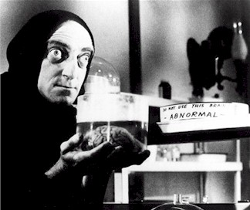 The current research into how brain function impacts criminal or moral behavior quickly conjures images of One Flew Over the Cuckoo’s Nest and Minority Report. Neuroimaging data is becoming more frequently used in the courtroom, especially in the context of capital cases. The idea is that this technique can give scientist (and listening jurors) an idea as to the future dangerousness of a criminal. By scanning the portion of the brain regulating behavior and impulsivity, scientist believe they can create a reliable prediction as to whether a person is going to re-offend.
The current research into how brain function impacts criminal or moral behavior quickly conjures images of One Flew Over the Cuckoo’s Nest and Minority Report. Neuroimaging data is becoming more frequently used in the courtroom, especially in the context of capital cases. The idea is that this technique can give scientist (and listening jurors) an idea as to the future dangerousness of a criminal. By scanning the portion of the brain regulating behavior and impulsivity, scientist believe they can create a reliable prediction as to whether a person is going to re-offend.
The area of “social neuroscience” is becoming a larger part of societies understanding of criminal behavior. So, let’s say we pinpoint the “bad brain spot.” What does that mean for our criminal justice system? Is it time to crank up the ol’ prison lobotomy rooms? Or do we just resolve to keep people with bad brains locked up and out of the gene pool?
Clearly, this research is a step in the right direction of understanding criminality. Unfortunately, I see this research taking us down a scary road. I cannot see legislators lining up to put funding into providing upstream mental-health services for people with antisocial disorders and diseases. Generally, our system takes the approach of sitting back and waiting until mental illness leads someone to incarceration, and then we house the mentally ill and treat symptoms. Moral judgment is an area of interest in studies of people that are high-functioning on the autism spectrum. In this area, there may be relief. But there are not celebrities and activists speaking up on behalf of the antisocial.
My hope is that at a minimum this research will contribute to our collective empathy for the criminal element of our society. As I have said before, no one wants to be broken. Although I hope, I am not optimistic. The notion that criminal behavior may be the result of what could be characterized as a disability doesn’t sit well with our current ideas of culpability or (in the religious context) free will. We like to think we are not criminals, because we choose to be good people. It’s deflating to our sense of self to think it is not our choice at all, we just happened to get handed out a brain from one of the good batches.

